
Journal Menu
► ▼ Journal Menu-
- Nanomaterials Home
- Aims & Scope
- Editorial Board
- Reviewer Board
- Topical Advisory Panel
- Instructions for Authors
- Special Issues
- Topics
- Sections & Collections
- Article Processing Charge
- Indexing & Archiving
- Editor’s Choice Articles
- Most Cited & Viewed
- Journal Statistics
- Journal History
- Journal Awards
- Society Collaborations
- Conferences
- Editorial Office
Journal Browser
► ▼ Journal BrowserNeed Help?
Announcements
25 April 2025
Nanomaterials Exceptional Reviewers List 2025
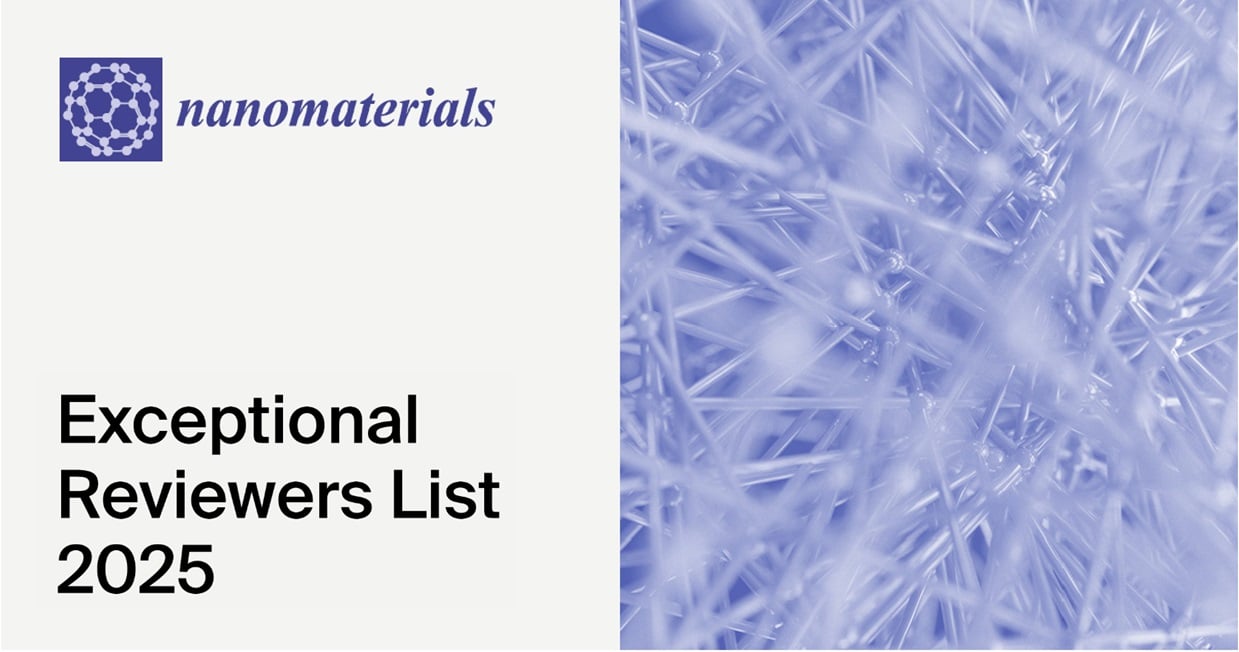
We are thrilled to share the updated Exceptional Reviewers List 2025. This program was designed to recognize and honor scholars who have delivered consistently exceptional review reports to our journal.
Committed to fostering rigorous research and promoting knowledge exchange, Nanomaterials (ISSN: 2079-4991) recognizes the significant role that our reviewers play in maintaining the quality and integrity of the articles we publish. According to the surveys conducted in 2024, 92% of our authors rate the peer review process as good or excellent, thanks to our pool of excellent reviewers.
We would like to express our sincere appreciation to all reviewers who have generously volunteered their time and expertise to assist in Nanomaterials’ peer review process. Their dedication and attention to detail in evaluating manuscripts, offering valuable feedback, and contributing to academic rigor are truly commendable.
The Exceptional Reviewers List was introduced in April 2024. Each quarter we will select a group of outstanding reviewers and introduce them here.
Q1
Name: Dr. Aurelio Hierro-Rodriguez
Affiliation: Department of Physics, University of Oviedo, 33007 Oviedo, Spain
Interests: 3D nanomagnetism; nanofabrication; magnetic thin films; X-ray magnetic vector tomography
“I think that the review process is key to maintaining excellence in scientific research. Referees have a great responsibility as they ensure high-quality standards and help to construct a fairer, more honest and transparent scientific system by being critical, constructive, comprehensive and helpful to authors and editors.”
Name: Dr. Maria Luisa Della Rocca
Affiliation: Laboratoire des Matériaux et Phénomènes Quantiques, Université Paris Cité, CNRS, 75013 Paris, France
Interests: thermoelectricity; 2D materials; quantum transport; molecular electronics
Name: Dr. Nelson Filipe Lopes Dias
Affiliation: Institute of Materials Engineering, TU Dortmund University, 44227 Dortmund, Germany
Interests: diamond-like carbon; amorphous carbon; magnetron sputtering; physical vapor deposition; tribology
23 April 2025
Meet Us at the World Conference on Carbon 2025, 29 June–4 July 2025, Saint-Malo, France
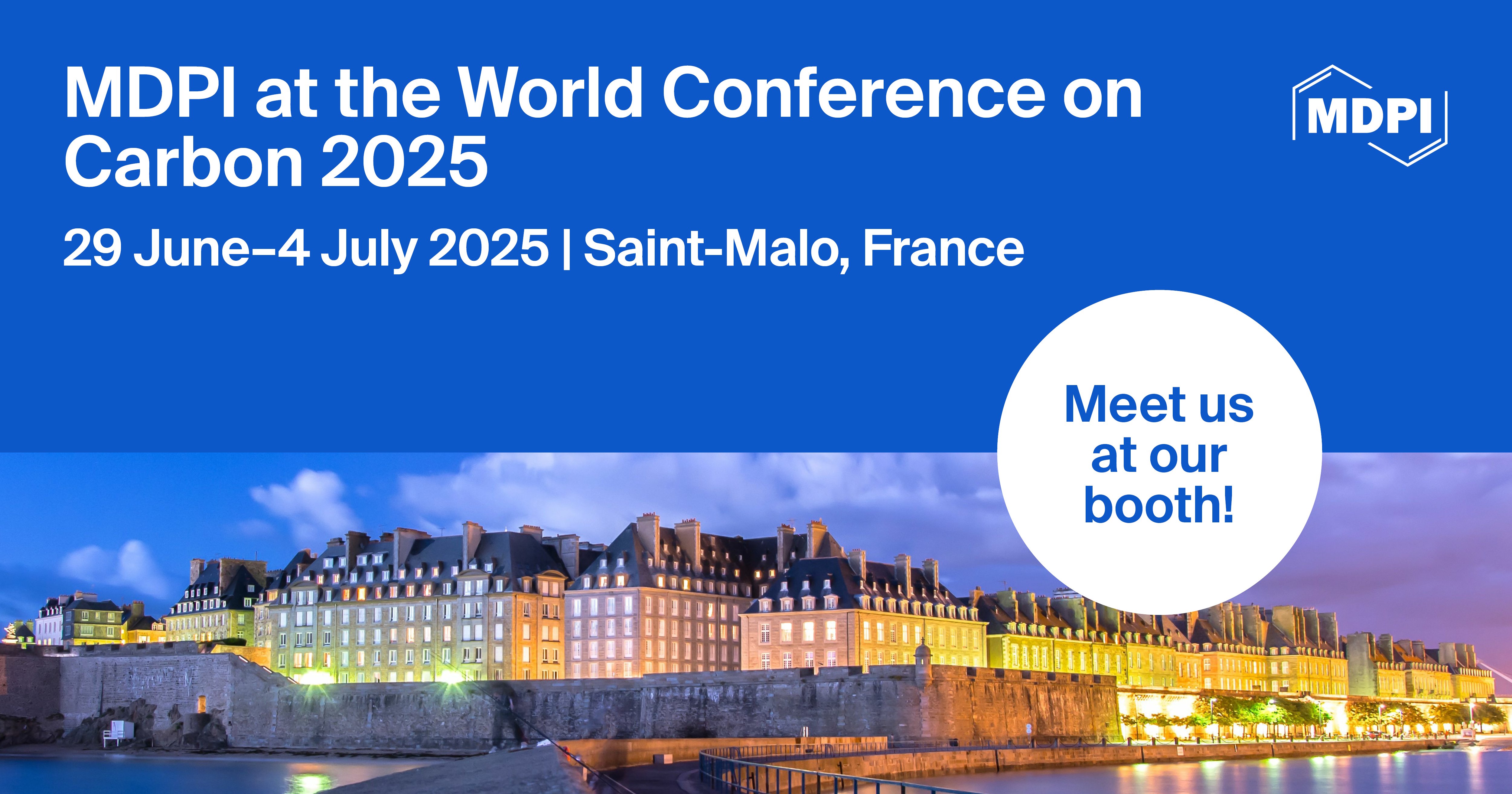
Conference: The World Conference on Carbon 2025
Organization: Société Francophone d’Étude des Carbones and European Carbon Association
Date: 29 June–4 July 2025
Place: Saint-Malo, France
MDPI will be attending the World Conference on Carbon 2025 as an exhibitor, which will be held from 29 June to 4 July 2025. We welcome researchers from different backgrounds to visit and share their latest ideas with us.
This conference is jointly organized by the Société Francophone d’Étude des Carbones (SFEC) and the University of Rennes, on behalf of the European Carbon Association (ECA).
Topics include the following:
- Carbon and biology, medicine, safety;
- Carbon and environment;
- Carbon and electrochemical processes and technologies;
- Carbon and catalysis;
- Carbon and electronics;
- Innovations in synthesis, processing, characterization, and modeling;
- Innovative materials;
- Carbon for structural applications and thermal management;
- Carbon nanoforms;
- Kerogens, coals, cokes, graphite, carbonization/graphitization processes;
- sp³ C-rich carbons;
- Perspectives on raw materials sourcing for carbon and graphite and industrial processes.
The following MDPI journals will be represented:
If you plan to attend this conference, please feel free to stop by our booth. Our delegates look forward to meeting you in person to answer any questions you may have.
For more information about the conference, please visit the following link: https://premc.org/carbon2025/.
11 April 2025
Nanomaterials | Special Issue Mentor Program

We are pleased to announce the launch of a new initiative: the Nanomaterials Special Issue Mentor Program.
This program will enable early career researchers (who must hold a Ph.D. in a related field) to gain experience in editing a Special Issue in an MDPI journal under the mentorship of our experienced Editorial Board Members or other experienced scientists.
The mentor program will provide an excellent opportunity for early career scientists to gain editorial experience and cultivate their ability to edit scientific research.
The mentee’s responsibilities include the following:
- Proposing a Special Issue title and assisting the mentor in preparing a summary (around 200–400 words) and 3–10 keywords describing the background, importance, and goal of the Special Issue;
- Writing a brief promotion plan for the Special Issue;
- Preparing a list of scholars who may be interested in the Special Issue and personally e-mailing invitations on behalf of the Guest Editors;
- Writing an Editorial for the online Special Issue together with their mentor.
The mentor’s responsibilities include the following:
- Conducting a final check before the Special Issue is published online;
- Being responsible for editorial control of the Special Issue and quality control of the publications, both of which must be carried out in a timely manner;
- Providing suggestions to younger scholars if they have any doubts or concerns regarding submissions;
- Organizing regular video calls with young scholars and the Editorial Office to discuss problems and improvement suggestions for the Special Issue;
- Making and submitting decisions regarding submissions with the assistance of mentees.
Certificates and awards:
After the Special Issue closes, the Editorial Office will provide official certificates for all the mentors and early career researchers.
If you are interested in this opportunity, please send your Special Issue proposal to the Nanomaterials Editorial Office, and we will discuss the process (i.e., mentor collaboration, Special Issue topic feasibility analysis, etc.) in further detail.
In addition to the new Special Issue Mentor Program, Nanomaterials (ISSN: 2079-4991) will continue to welcome all Special Issue proposals focusing on cutting-edge research topics.
11 April 2025
Meet Us at the 16th European Congress on Catalysis (EuropaCat 2025), 31 August–5 September 2025, Trondheim, Norway
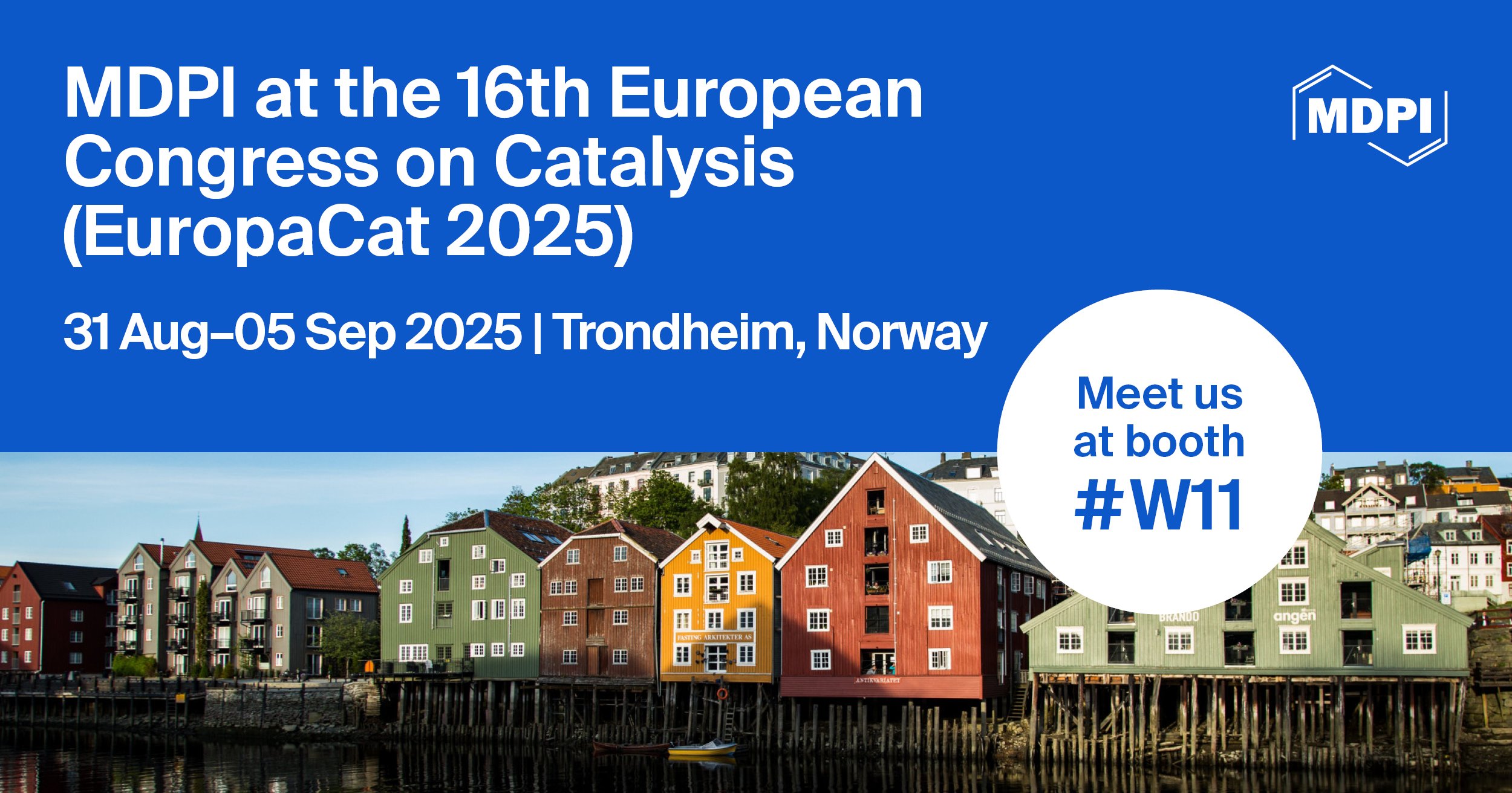
Conference: The 16th European Congress on Catalysis (EuropaCat 2025)
Date: 31 August–5 September 2025
Location: Trondheim, Norway
MDPI will be attending the 16th European Congress on Catalysis (EuropaCat 2025) as an exhibitor, welcoming researchers from diverse backgrounds to visit and share their latest ideas.
This will be the 16th European Congress on Catalysis under the auspices of the European Federation of Catalysis Societies (EFCATS) and organized as a joint effort of the Nordic Catalysis Societies. The target groups for EuropaCat 2025 are academia and industry, focusing on fundamental research, applied research and development within catalysis.
EuropaCat 2025 urges you to join and bring excellent science, hard work, bright ideas, successful catalyst development, innovative solutions and an open mind. It is clear that mastering “the force” of catalysis will be vital for overcoming the resource and environmental challenges that lie ahead for humanity.
The following MDPI journals will be represented:
- Molecules;
- Catalysts;
- Solids;
- Energies;
- Materials;
- Chemistry;
- Symmetry;
- Applied Sciences;
- Nanomaterials;
- Photochem;
- C — Journal of Carbon Research.
If you are planning to attend this conference, please do not hesitate to start an online conversation with us. Our delegates look forward to meeting you in person and answering any questions that you may have. For more information, please visit https://www.ntnu.edu/europacat2025.
7 April 2025
Interview with Dr. Yinghong Zhou and Dr. Francesca Lo Presti—Nanomaterials 2025 Travel Award Winners
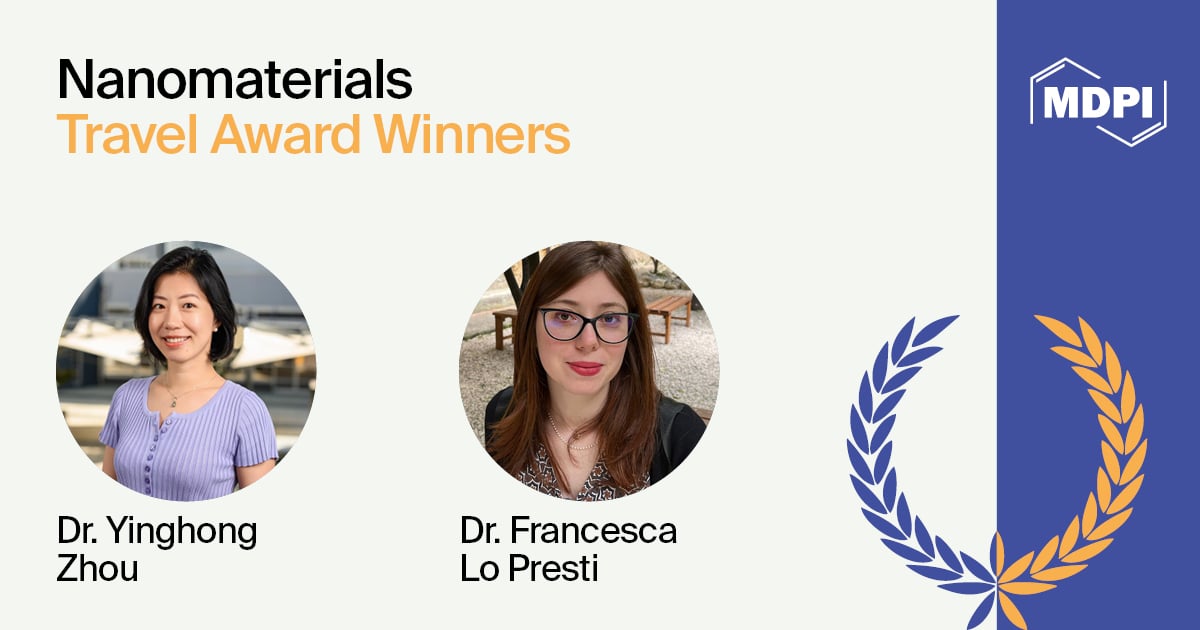
The Nanomaterials Travel Award was launched in 2016, and it is granted every year to encourage junior scientists to present their latest research at academic conferences in the field of nanoscience and nanotechnology, helping to increase their influence. All winners are selected by the journal’s Award Committee.
Let us hear their opinions and hear about their experiences with scientific research and awards.
Meet Dr. Yinghong Zhou—Winner of the Nanomaterials 2025 Travel Award
Name: Dr. Yinghong Zhou
Affiliation: The University of Queensland, Australia
Research interests: stem cells; osteoimmunology; mineralised tissue regeneration (bone and teeth); tissue engineering; regenerative medicine
1. Can you briefly introduce the main focus of your research and its significance in the field of nanomaterials? What inspired you to pursue research in this field?
My research focuses on developing immunoengineered nanomaterials for bone and periodontal tissue regeneration, aiming to transform treatment approaches for bone defects and periodontal diseases. Periodontitis, a leading cause of tooth loss, affects millions worldwide and significantly impacts both oral and systemic health. By developing personalized, nanomaterial-based treatments, I seek to modulate immune responses and promote sustainable tissue regeneration, ultimately improving long-term clinical outcomes.
What drives me most is the opportunity to create a meaningful impact—helping individuals regain their smiles and improving their overall well-being. The pursuit of scientific innovation in regenerative dentistry inspires me daily, as I explore new solutions that have the potential to revolutionize oral healthcare and improve patients’ quality of life.
2. When and how did you become aware of the Nanomaterials journal, and what motivated you to apply for the Nanomaterials 2025 Travel Award?
I first became aware of the Nanomaterials journal early in my research career and frequently explored its publications in the fields of biomaterials and tissue engineering. Its commitment to advancing nanoscience research and open access platform made it a valuable resource for my work.
My motivation to apply for the Nanomaterials 2025 Travel Award stemmed from the importance of sharing research findings and engaging with the global scientific community. Attending international conferences is pivotal for fostering collaborations, exchanging ideas, and staying at the forefront of nanomaterials research. This award represents an excellent opportunity to present my work on an international stage and contribute to the ongoing advancements in the field.
3. How will you promote the Nanomaterials journal at the conference? Apart from conferences, what are your preferred avenues for promoting Nanomaterials within your community?
I will highlight the Nanomaterials journal during my presentations, encouraging colleagues and attendees to consider it as a platform for disseminating their research.
Beyond conferences, I will promote the journal through my academic networks by sharing relevant articles with a wider audience. I will also introduce the journal to faculty and students during seminars and workshops, highlighting its relevance to ongoing research projects.
4. Do you have any other suggestions regarding how our journal could further support young researchers and the academic community?
It would be great to see the journal develop Mentorship Programs that connect early-career researchers with established experts in nanomaterials, facilitating knowledge exchange and professional development. Additionally, educational workshops and webinars focused on research methodologies, scientific writing, and career development strategies would offer valuable opportunities to support the growth of the next generation of scientists.
Meet Dr. Francesca Lo Presti—Winner of the Nanomaterials 2025 Travel Award
Name: Dr. Francesca Lo Presti
Affiliation: Università degli Studi di Catania, Italy
Research interests: nanomaterials; thin films; film characterization; energy conversion; sol–gel
1. Can you briefly introduce the main focus of your research and its significance in the field of nanomaterials? What inspired you to pursue research in this field?
My research focuses on the production of nanomaterials in the form of thin films using vapor-phase or solution-based approaches. These materials exhibit different properties relevant to the fields of photovoltaics and piezoelectrics. The significance of this work lies in its potential to explore the capabilities of nanostructured thin films while preserving the key properties of bulk materials. This can lead to innovative applications and improved performance in various technologies.
2. When and how did you become aware of the Nanomaterialsjournal, and what motivated you to apply for the Nanomaterials 2025 Travel Award?
I became aware of Nanomaterials during my research, as I recently published an article in your journal. I also received a promotional email about this award, which caught my attention. I applied for the Nanomaterials 2025 Travel Award because I strongly believe in the importance of sharing research with other researchers.
3. How will you promote the Nanomaterialsjournal at a conference? Apart from conferences, what are your preferred avenues for promoting Nanomaterialswithin your community?
At conferences, I will actively mention Nanomaterials in my presentations and discussions with colleagues. Beyond conferences, I have promoted Nanomaterials by sharing articles on social media, as well as by spreading awareness about the award.
4. As the winner of this award, would you like to take a moment to share your thoughts with our readers or express gratitude towards those who have played a significant role in your research accomplishments?
I am honored to receive the Nanomaterials 2025 Travel Award, and I appreciate this opportunity to present my research at an international conference. This recognition serves as a great motivation to continue exploring the fascinating world of nanomaterials.
2 April 2025
Nanomaterials | Article Processing Charge (APC) Adjustment
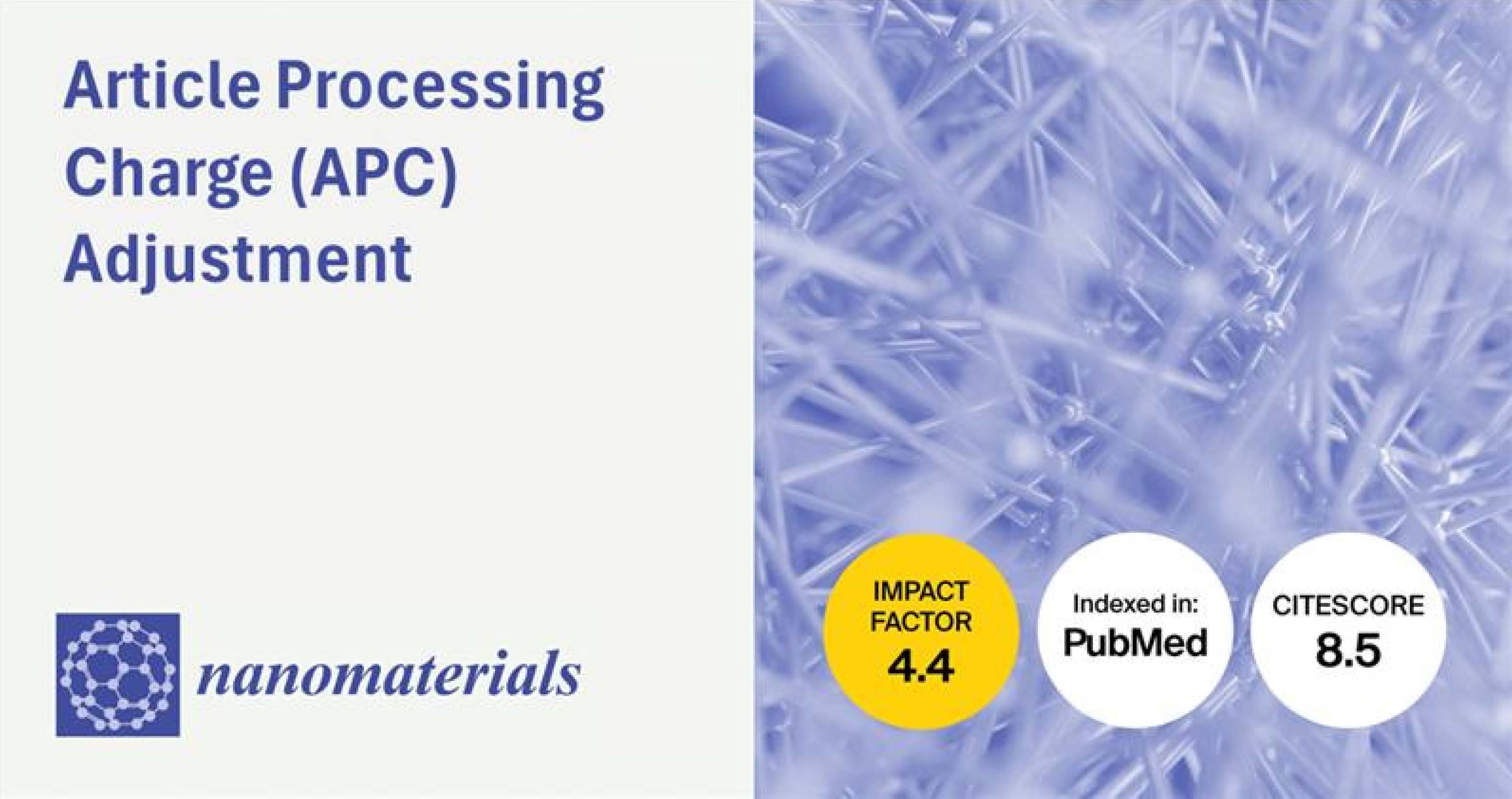
All articles published in Nanomaterials are published in a fully open access format. An article processing charge (APC) of CHF 2900 applies to papers accepted following peer review. In celebration of the 15th anniversary of Nanomaterials, for papers submitted after 31 March 2025 and before 31 December 2025, an APC of CHF 2400 will be applied.
This adjustment has been made with the aim of reducing the financial burden on researchers, particularly those constrained by limited funding, and support broader participation in high-quality academic exchange. Through this change, we also wish to express our sincere gratitude for the trust and support that the academic community has shown in our journal over the years.
We look forward to future collaborations with more scholars to advance academic progress and enhance the exchange of knowledge!
Please contact nanomaterials@mdpi.com if you have any questions or suggestions.
2 April 2025
MDPI INSIGHTS: The CEO's Letter #21 - Annual Report, Swiss Consortium, IWD, ICARS, Serbia

Welcome to the MDPI Insights: The CEO's Letter.
In these monthly letters, I will showcase two key aspects of our work at MDPI: our commitment to empowering researchers and our determination to facilitating open scientific exchange.
Opening Thoughts

MDPI Releases 2024 Annual Achievements Report
I’m pleased to share the release of MDPI’s 2024 Annual Achievements Report, which reflects our commitment to efficiency, transparency, and excellence in scholarly communication. The report showcases key themes related to our growth (highlighting our workforce expansion, new offices, journal milestones), excellence (editorial and publishing advancements), people (talent development and training), and community (partnerships, conferences, and outreach).
MDPI continues to build connections and drive scientific progress
Our mission remains clear: to support researchers worldwide by delivering an efficient, high-quality publishing experience while strengthening the global Open Access (OA) movement.
Advancing Open Access: A Global Knowledge Hub
In 2024, we published 238,000 peer-reviewed OA articles, reaching over 25 million downloads. This reinforces MDPI’s role as a global knowledge hub, breaking down barriers to access and ensuring that high-quality research is freely available to everyone. As part of the OA movement, we are actively democratizing knowledge, making scientific advancements accessible to researchers, policymakers, educators, and the public, without the restrictions of traditional paywalls.
Expanding our Workforce and Strengthening Research Integrity
Our global presence grew in 2024 with the opening of a new Seoul office, and our workforce expanded to 6,650 staff across 21 offices. This reflects our continued growth mindset and investment in global accessibility. We also continued to take a proactive stance on our commitment to research integrity, tripling our team in this area and joining STM’s Integrity Hub and United2Act. This means more rigorous quality control, stronger safeguards, and collaboration with global initiatives to detect and combat unethical publishing practices at an industry level. Our growth is about reinforcing our role as a trusted, ethical, and accessible publishing platform for researchers worldwide.
Growing Partnerships and Impact in Scholarly Communication
MDPI’s partnerships continue to thrive, with over 900 institutional collaborations, including a landmark agreement with ZB MED in Germany, covering more than 100 universities. Additionally, more than 90% of evaluated MDPI journals have been accepted into Web of Science, including 60 new acceptances in 2024, with nearly 300 journals expected to receive a Journal Impact Factor in 2025. In the same period, 37 MDPI journals were accepted into Scopus, bringing our total indexed titles to 306. Most importantly, 95% of authors rate their experience with MDPI as excellent or good – an achievement that underscores our dedication to serving the research community.
I encourage you to read through our Annual Report, which highlights these milestones and our vision for the future. Thank you for being part of MDPI’s journey in advancing open science.
Impactful Research

MDPI Renews Partnership with CSAL to Support Swiss Universities
I am pleased to announce the renewal of our partnership with the Consortium of Swiss Academic Libraries (CSAL) for 2025. This extension reinforces MDPI's dedication to advancing open science through transparency, efficiency, and collaboration.
Our renewed agreement with CSAL strengthens support for Swiss universities, ensuring that gold open access publishing remains both accessible and affordable for researchers across Switzerland. Among the institutions participating in this agreement are ETH Zurich and EPFL Lausanne, along with 20 other leading institutions, further expanding the reach and impact of our collaborative efforts.
To date, over 3.9 million researchers have published their findings in MDPI journals, a testament to our role in enhancing Switzerland's position as a hub for university education and research.
Inside MDPI

Celebrating International Women's Day: Accelerating Action
In honour of International Women's Day, MDPI embraced the theme “Accelerate Action,” a global call to advance women's progress by implementing effective strategies and resources. As part of our commitment, we highlighted how open access publishing empowers female voices in research and academia.
Throughout March, we featured original blogs authored by MDPI’s female contributors, showcasing the successes of our journals and employees, and addressing pressing topics such as women's health.
“Open Access supports women in education”
Women Accelerating Action Outside of MDPI

MDPI employee Ana Zdravkovic is accelerating action outside of her MDPI role as a Production Assistant. Working with like-minded women at the award-winning Belgrade-based organization UZOR OsnaŽene (meaning ‘empowered women’), they identify serious flaws in cybersecurity, and help protect women and children against online predators by providing evidence to improve legislation and laws around cyber-attacks.
In this article, we interview Ana, celebrating the important and inspiring work that she and the organisation do.
How Open Access Supports Women in Education

Every day, women and girls face barriers in education or career progression. This is caused by a range of factors, including social expectations, poverty, and poor infrastructure.
Quality opportunities and participation in the education system by women is essential to achieving equality and fulfilling their human rights.
Here, we examine how Open Access supports women in education by removing barriers and ensuring that vital research is accessible.
Recent Advancements in Research on Endometriosis

March is Endometriosis Action Month. Endometriosis is a medical condition affecting women and young girls of reproductive age, often causing symptoms such as severe pelvic pain, irregular periods, and infertility.
More research on endometriosis is still urgently needed.
This research will help develop efficient diagnoses and better treatment for those struggling with the condition.
In this article, we explore what endometriosis is and discuss the latest research advancements on the disease.
We also curated a selection of MDPI journals, articles, and Special Issues focusing on gender equity, women in the workplace, and women’s health. Find out more about these by visiting our IWD – Accelerate Action landing page.
As I reflect on the month of March and International Women’s Day, I would like to take a moment to recognize and thank all of the incredible women at MDPI for your dedication to democratizing knowledge and shaping open access. Your contributions are invaluable, and they continue to shape the future of MDPI.
Coming Together for Science

The International Conference on Advanced Remote Sensing (ICARS 2025)
The International Conference on Advanced Remote Sensing (ICARS 2025) took place from 26–28 March 2025, in Barcelona, Spain. It was chaired by Prof. Dr. Fabio Tosti from the Faringdon Research Centre for Non-Destructive Testing and Remote Sensing (UK), Prof. Dr. Andrea Benedetto from University Roma Tre (Italy), and Prof. Dr. Luis Ángel Ruiz from Universitat Politècnica de València (UPV, Spain).
Over three days, the conference explored innovations in Earth and environmental sciences, engineering advancements, and practical applications in biological and agricultural fields.


I am pleased to share that the 1st edition of ICARS 2025 was a great success, with 133 attendees out of 146 registrations. The event featured 43 short talks, 64 posters, and 103 accepted abstracts, along with nine keynote speakers and a major panel with five expert panellists.
Over 60 attendees joined the conference dinner, and the event received outstanding feedback.
The main goal of ICARS2025 was to cover how advanced remote sensing technologies are transforming our approach to global challenges.

Awards
Four awards were presented at the conclusion of the conference, sponsored by the journal Remote Sensing: Best Poster Award (€400), Best Oral Presentation Award (€400), and two Early Career Researcher Awards (1st prize: €600 and 2nd prize: €200).
Thank you to our Partnering Societies
We are grateful for the support of our four partnering societies and nine media partners, who played an important role in promoting the conference. Special thanks to our partnering societies: the European Federation of Geologists (EFG), Geoscience Energy Society of Great Britain (GESGB), Asociación Española de Teledetección (AET) – the Spanish Association of Remote Sensing, and the International Society for Digital Earth (ISDE).
Upcoming In-Person Event

31 March–2 April 2025
Plants 2025: From Seeds to Food Security
Location: Barcelona, Spain
This event will gather plant scientists to discuss the latest research on how to feed a growing population while maintaining a sustainable agro-ecosystem.
Find more upcoming MDPI events here.
Closing Thoughts

MDPI Serbia Salon 2025: A Gathering of Academic Excellence
On Tuesday, 18 March, we successfully concluded our first MDPI Serbia Salon in Belgrade. This event provided a great opportunity to showcase MDPI’s achievements, strengthen connections with the Serbian academic community, and highlight our role as the largest publisher in Serbia. We were honoured to welcome Prof. Dr. Sergej M. Ostojić, Editor-in-Chief of MDPI journal Clinical Bioenergetics, as a guest speaker.

Over the past five years, MDPI has experienced continuous growth in Serbia, with an increasing number of publications, an expansion of Editorial Board memberships, and a greater number of active peer reviewers. The Salon allowed us to express our thanks to the Serbian research community while gathering feedback from attendees representing several major universities.
Discussion topics

As part of the event, I delivered an opening speech highlighting MDPI’s achievements and direction.
The event featured presentations from MDPI colleagues, including discussions on open science, publishing ethics, and our achievements in Serbia.
A special thank-you to all our MDPI presenters, panellists, and organizers who made his event a success. I hope the MDPI Serbia Salon becomes a tradition for years to come, creating connections within the Serbian research community.
Visit to the Science Fund of Serbia and The Ministry of Science
During my visit to Belgrade, I had the opportunity to join my colleagues Emir Ramadani (Operations Manager) and Nevena Blagojev (Journal Relations Manager) in meetings with the Science Fund of Serbia and the Ministry of Science, where we received strong support for our work in Serbia.
Both organizations highly value our presence in and commitment to Serbia, where we employ over 640 staff across our two offices in Belgrade and Novi Sad. We take great pride in creating job opportunities and supporting the community in Serbia.

“There’s a lot of exciting activity happening in MDPI Serbia”
Speaking with our Serbian Colleagues

Finally, I had the opportunity to speak with our Serbian colleagues about our initiatives to expand and to improve our marketing & communication and public relations activities.
It was great to have an open discussion with colleagues – both in person and with the hundreds who joined online.
This visit to Belgrade had been a long time coming for me. Serbia is our largest operation in Europe and there’s a lot of exciting activity happening in MDPI Serbia, including the launch of a new office floor in Novi Sad and the growth and expansion of our teams.
I look forward to returning soon and continuing to support our colleagues across our Serbian offices.
Chief Executive Officer
MDPI AG
29 March 2025
Meet Us at the 23rd International Conference on Solid-State Sensors, Actuators and Microsystems, 29 June–3 July 2025, Orlando, USA
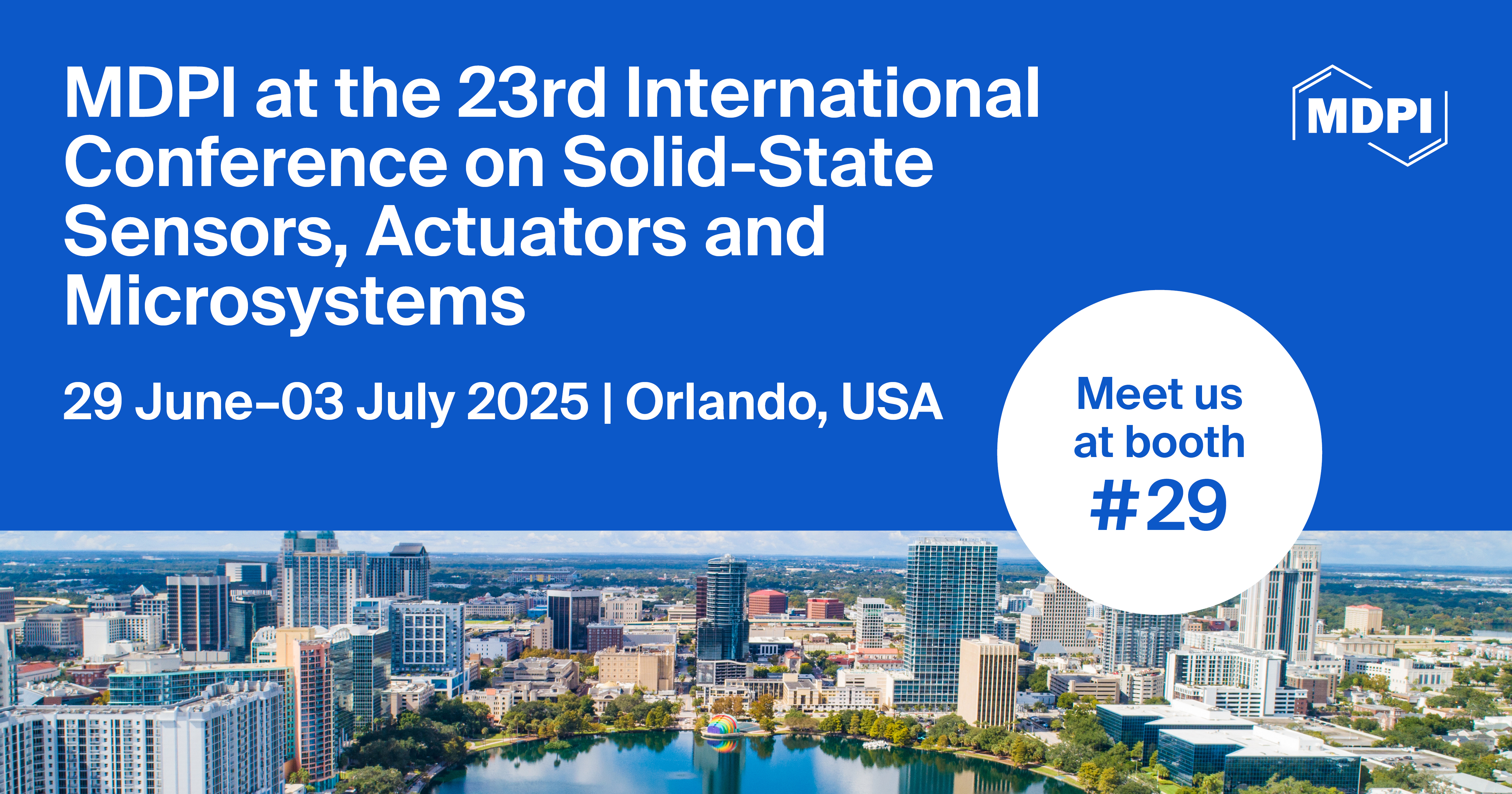
MDPI will be attending the 23rd International Conference on Solid-State Sensors, Actuators and Microsystems in Orlando, Florida, USA. The conference will begin on Sunday, 29 June 2025, with short courses providing a scholarly introduction and overview of some selected topics of interest, which will help academics and professionals become familiar with the latest trends in the field; the topics of the short courses will be announced shortly. Conference registration will also open on 29 June, with a welcome reception at which attendees can meet and greet each other at that evening. The conference technical program will begin on the morning of 30 June, with plenary sessions that will then breakout into parallel sessions, industry talks, and poster sessions throughout the duration of the conference. The exhibition portion, which will take place from 30 June through 3 July, is designed to give companies, start-ups, and scientific associations the opportunity to share information about or demonstrate their latest advances, products, and/or services. We welcome you to visit the MDPI booth, number 29, where you can have face-to-face exchanges with our representatives, learn more about our open access publishing services, and receive gifts. The program has been designed to provide plenty of opportunities for technical exchange and professional networking.
The following MDPI journals will be represented at the conference:
- Sensors;
- Micromachines;
- Biosensors;
- JETA;
- Nanomaterials;
- JSAN;
- JLPEA;
- Electronics;
- Biomimetics;
- Nanomanufacturing;
- Chemosensors;
- Acoustics;
- Magnetism.
If you are attending this conference, please feel free to start a conversation with us at our booth. Our delegates look forward to meeting you in person and answering any questions that you may have.
28 March 2025
International Day of Zero Waste—“Towards Zero Waste in Fashion and Textiles”, 30 March 2025

The International Day of Zero Waste, jointly facilitated by the United Nations Environment Program (UNEP) and the UN Human Settlements Program (UN-Habitat), highlights the importance of bolstering waste management globally and the need to promote sustainable consumption and production patterns to address the waste pollution crisis.
Waste pollution threatens human health, costs the global economy hundreds of billions of dollars every year, and aggravates the triple planetary crisis of climate change, nature, land, and biodiversity loss, as well as pollution and waste.
This year’s International Day of Zero Waste, with the theme of “Towards Zero Waste in Fashion and Textiles”, emphasizes the need for action in the fashion and textile sector to reduce waste and advance circular solutions.
We hope that established journals in the field of Environmental & Earth Sciences at MDPI, including Applied Sciences, Atmosphere, Clean Technologies, Environments, Foods, Nanomaterials, Recycling, Resources, Separations, Sustainability, Urban Science and Waste, will provide an invaluable platform for the exchange of innovative ideas regarding zero waste.

 |
 |
 |
 |
 |
 |
 |
 |
 |
 |
 |
 |

“Recycling of Multilayer Flexible Packaging Waste Through Delamination with Recoverable Switchable Hydrophilicity Solvents”
by Roberta Mastroddi, Chiara Samorì, Martina Vagnoni, Chiara Gualandi, Paola Galletti and Emilio Tagliavini
Separations 2025, 12(2), 45; https://doi.org/10.3390/separations12020045
“Integration of Circular Economy and Urban Metabolism for a Resilient Waste-Based Sustainable Urban Environment”
by Konstantina Ragazou, Georgia Zournatzidou, George Sklavos and Nikolaos Sariannidis
Urban Sci. 2024, 8(4), 175; https://doi.org/10.3390/urbansci8040175
“Use of Vegetable Waste for New Ecological Methods in Wool Fibre Treatments”
by Simona Gavrilaș, Mihaela Dochia, Andreea-Raluca Sărsan, Bianca-Denisa Chereji and Florentina-Daniela Munteanu
Clean Technol. 2024, 6(4), 1326-1339; https://doi.org/10.3390/cleantechnol6040063
“Circular Bioeconomy in Action: Transforming Food Wastes into Renewable Food Resources”
by Priti Pal, Akhilesh Kumar Singh, Rajesh Kumar Srivastava, Saurabh Singh Rathore, Uttam Kumar Sahoo, Sanjukta Subudhi, Prakash Kumar Sarangi and Piotr Prus
Foods 2024, 13(18), 3007; https://doi.org/10.3390/foods13183007
“Review on Sustainable Construction and Demolition Waste Management—Challenges and Research Prospects”
by Noushin Islam, Malindu Sandanayake, Shobha Muthukumaran and Dimuth Navaratna
Sustainability 2024, 16(8), 3289; https://doi.org/10.3390/su16083289
“Enhanced Extraction of Carotenoids from Tomato Industry Waste Using Menthol/Fatty Acid Deep Eutectic Solvent”
by Despoina Vlachoudi, Theodoros Chatzimitakos, Vassilis Athanasiadis, Eleni Bozinou and Stavros I. Lalas
Waste 2023, 1(4), 977-992; https://doi.org/10.3390/waste1040056
“Waste Management in the Smart City: Current Practices and Future Directions”
by Danuta Szpilko, Antonio de la Torre Gallegos, Felix Jimenez Naharro, Agnieszka Rzepka and Angelika Remiszewska
Resources 2023, 12(10), 115; https://doi.org/10.3390/resources12100115
“Modern Technologies for Waste Management: A Review”
by Wojciech Czekała, Jędrzej Drozdowski and Piotr Łabiak
Appl. Sci. 2023, 13(15), 8847; https://doi.org/10.3390/app13158847
“Environmental and Social Life Cycle Assessment of Waste Electrical and Electronic Equipment Management in Italy According to EU Directives”
by Patrizia Ghisellini, Renato Passaro and Sergio Ulgiati
Environments 2023, 10(7), 106; https://doi.org/10.3390/environments10070106
“Life Cycle Assessment (LCA) of 3D Concrete Printing and Casting Processes for Cementitious Materials Incorporating Ground Waste Tire Rubber”
by Matteo Sambucci, Ilario Biblioteca and Marco Valente
Recycling 2023, 8(1), 15; https://doi.org/10.3390/recycling8010015
| “Challenges and Opportunities in Plastic Waste Management” Guest Editors: Dr. Wan-Ting (Grace) Chen and Dr. Daniel Lachos-Perez Submission deadline: 1 July 2025 |
“Waste Valorization and Management to Increase the Resources Sustainability” |
 |
 |
|
“Emerging Technologies for Waste Treatment, Pollution Control and Resource Recovery” |
“New Trends in Liquid and Solid Effluent Treatment” |
 |
 |

 |
 |
 |
 |
24 March 2025
Interview with Dr. Ayala Lampel, Prof. Dr. Hai-Tian Zhang and Dr. Yu Song—2024 Nanomaterials Young Investigator Award Winners
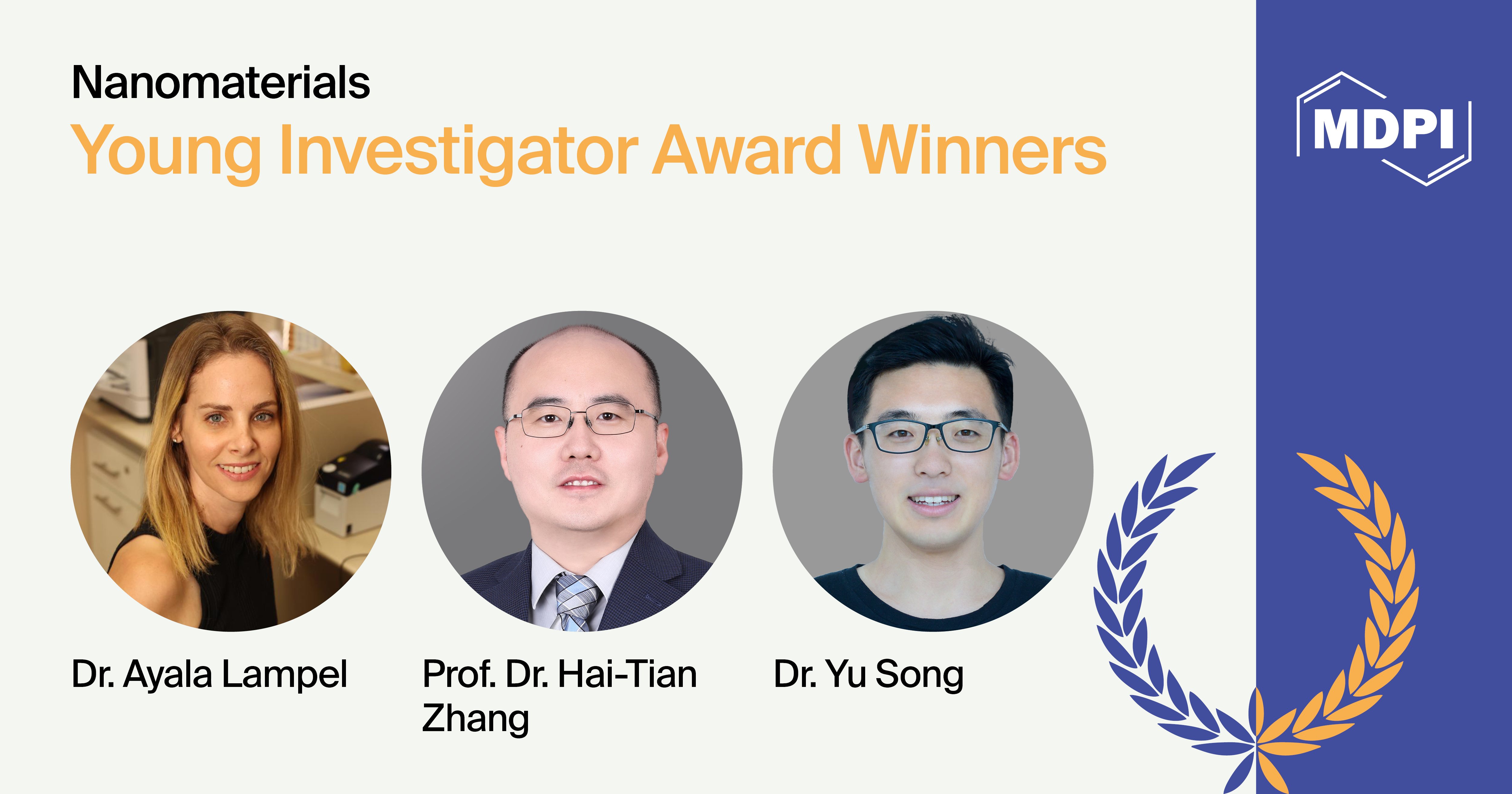
The Nanomaterials Young Investigator Award was established in 2018 to acknowledge the achievements of young investigators in the field of nanoscience and nanotechnology. All winners were chosen by the journal’s award committee.
Let us hear their opinions and hear about their experiences with scientific research and awards.
Meet Dr. Ayala Lampel—Winner of the Nanomaterials 2024 Young Investigator Award
Name: Dr. Ayala Lampel
Affiliation: Tel Aviv University, Israel
Research interests: molecular materials based on ordered/disordered supramolecular peptides, including melanin-mimicking materials
1. Could you give a brief introduction of yourself to the readers? Could you introduce your current research direction and provide an update on your progress?
I am an Associate Professor in the Shmunis School of Biomedicine and Cancer Research at the Faculty of Life Sciences, Tel Aviv University, Israel. After completing my Ph.D. in biotechnology at Tel Aviv University, I moved to New York for a postdoctoral fellowship at the Advanced Science Research Center (ASRC), City University of New York (CUNY), where I focused on developing molecular materials based on ordered/disordered supramolecular peptides, including melanin-mimicking materials.
In 2019, I established my independent research group at Tel Aviv University, initially focusing on designing biomolecular condensates using minimalistic peptide building blocks. Over time, our research expanded to developing multicomponent synthetic condensates from diverse building blocks for drug delivery, biosensing, and biocatalysis regulation. Additionally, we explored their application in controlling reactivity and regulating organic reactions, including an ERC-funded project on designer condensates for green chemistry applications.
2. Which research topics do you think will be of particular interest to the research community in the coming years?
The field of liquid-liquid phase separation (LLPS) and designed condensates has flourished over the past decade. An increasing number of researchers from supramolecular chemistry, systems chemistry, and bioinspired materials are exploring and developing phase-separated materials. I believe these emerging materials will remain a key area of interest in the coming years, particularly in advancing nanotechnology and biotechnology applications.
3. Do you have any advice for aspiring young researchers looking to make a meaningful impact in their respective fields?
My advice is simple: if you truly want to pursue an academic career, go for it. Tune out distractions and doubts, and trust your inner voice. Academia and science require persistence—trying, failing, and trying again. Try not to be discouraged by the failures; just keep moving forward. Whenever I feel frustrated by failure, I remind myself how fortunate I am to work in a curiosity-driven, knowledge-seeking field.
One more piece of advice, related to my answer to the next question: when choosing a Ph.D. or postdoc lab, prioritize finding an advisor who is also an excellent mentor. This may be even more important than any other factor in selecting a lab.
4. As the winner of this award, is there something you want to express or someone you wish to thank most?
I would like to express my gratitude to my Ph.D. advisor, Prof. Ehud Gazit, and my postdoctoral advisor, Prof. Rein Ulijn, for their exceptional support and mentorship. Their dedication and passion for science, commitment to their research groups, and genuine and thoughtful care for their students and mentees have profoundly shaped my approach as a mentor.
Meet Prof. Dr. Hai-Tian Zhang —Winner of the Nanomaterials 2024 Young Investigator Award
Name: Prof. Dr. Hai-Tian Zhang
Affiliation: Beihang University, China
Research interests: regulation of functional phase-change materials and application in brain-like computing devices; magnetic functional materials; nanomaterials
1. Could you give a brief introduction of yourself to the readers? Could you introduce your current research direction and provide an update on your progress?
My name is Hai-Tian Zhang, and I am a professor at Beihang University, Beijing, China. After obtaining my Ph.D. from The Pennsylvania State University, I worked as a Gilbreth Research Fellow at Purdue University, before joining Beihang University as a faculty member.
My research introduces a novel approach to bridging the gap between artificial intelligence devices and the human brain. By precisely manipulating the motion of hydrogen dopants in strongly correlated oxide thin films, I have developed artificial neuron and synapse hardware that features ultra-low energy consumption and ultra-fast responses. Traditional oxide neural devices rely on the movement of large cations (e.g., Ag+) and anions (e.g., O2-), consuming a high amount of energy at the pJ level, which significantly exceeds the fJ-level energy required for the human brain. In contrast, I have opted to work with hydrogen ions (protons) that are only 0.01% of the size of O2-. By taking advantage of their minuscule size and extremely low movement-energy barrier, the devices I am developing require only fJ-level energy for nanosecond neural computations, making their efficiency comparable to that of the human brain. Moreover, I am further developing devices with adaptive information processing and storage functionalities, achieving exceptional performance during complex environmental changes. My major achievements are summarized as follows:
- The fabrication of neuromorphic devices with ultra-low energy consumption (fJ level) and ultra-fast response (ns level) comparable to the human brain, drastically reducing energy consumption and boosting computing efficiency;
- The creation of artificial neurons and synapses capable of adapting to dynamic environments, enabling hardware-level adaptive function switching and information processing without reliance on AI algorithms, thereby greatly simplifying device structures and improving energy efficiency;
- The introduction of breakthrough functionalities in AI through various novel neuromorphic devices, particularly demonstrating performance that far exceeds traditional neural networks in handling complex environmental changes (e.g., a 250% improvement in decision-making ability, and a 300% enhancement in dynamic information-processing capability).
2. Could you please share some particularly interesting or unexpected results you have found during your research experience? Also, what is your opinion on interdisciplinary research?
My entire research journey can be described as a continuous process of interdisciplinary integration. During my Ph.D. studies at Penn State University, I focused on condensed matter physics and electronic devices, successfully developing the world's best-performing RF switches and logic devices in terms of loss and frequency performance at the time. Through this work, I was introduced to the concept of neuromorphic computing devices. After earning my Ph.D., I combined electronic devices with brain science and successfully secured a spot in the highly competitive Gilbreth Scholars Program at Purdue University (with a global acceptance rate of about 2%). This marked the beginning of my independent research in this novel and highly interdisciplinary field.
In multidisciplinary research, it is inevitable to encounter unfamiliar problems and challenges. At these times, it is essential to focus on the main issues and prioritize them effectively. Additionally, broad communication and collaboration with scientists from other fields are crucial.
3. Which research topics do you think will be of particular interest to the research community in the coming years?
I believe the exploration of brain-like computing devices is of particular interest. As Wu Zhaohui, then Vice Minister of the Ministry of Science and Technology of China and an academician of the Chinese Academy of Sciences, emphasized, discovering new mechanisms to overcome computational limitations has become one of the most urgent issues. Building brain-like computing devices is one of the main approaches to tackling this challenge (People’s Daily, January 11, 2022).
First, energy efficiency is one of the core challenges we face. Traditional von Neumann architecture consumes a significant amount of energy when performing complex computational tasks, as most energy is wasted on data transmission due to the separation of memory and processing. Brain-like computing, however, simulates biological neural networks and adopts a novel integrated memory-computation approach, fundamentally eliminating the energy waste associated with data transmission. My development of neuromorphic brain-like computing devices is the first to achieve artificial neural activity with femtojoule-level energy consumption, significantly reducing the energy demands of computing systems and providing a new solution to this global issue.
Second, improving computational speed is another major challenge. Traditional computing systems struggle to meet the demands of real-time processing and efficient computation due to their reliance on serial processing for large-scale data. Brain-like computing, through massive parallel processing, can greatly enhance computational speed. The neuromorphic devices I have developed not only respond to sub-nanosecond signals with exceptional speed and precision but also mimic the firing patterns of biological neurons, achieving efficient information transmission and processing. This offers a new pathway to overcoming the speed limitations of traditional computing.
Moreover, adaptive learning in artificial intelligence is a significant hurdle that I am addressing. Traditional computers rely on pre-programmed instructions to perform specific tasks, lacking flexibility and adaptability. Therefore, I have proposed an adaptive neuromorphic device based on ultra-low power and ultra-fast operation, capable of adjusting to ever-changing environments and task requirements, autonomously modifying response states, and reallocating computational resources. This hardware's enhanced adaptability in complex and dynamic environments lays the foundation for intelligent computing.
4. Do you have any advice for aspiring young researchers looking to make a meaningful impact in their respective fields?
Adhere to first-principles thinking.
5. What is your opinion of the open access model of publishing?
As a researcher, I have mixed but generally positive views on open access publishing. While I fully support making scientific knowledge freely available to accelerate discovery and benefit the public, the current implementation creates some practical hurdles. Open access definitely helps our work reach wider audiences and it is particularly valuable for bridging gaps between disciplines and helping researchers in developing countries access critical studies. That said, the high publishing fees can be prohibitive for early-career scientists or those in less-funded fields, creating an uneven playing field. There is also the lingering issue of predatory journals muddying the waters, which makes some colleagues hesitant to fully embrace the model. Overall though, despite the growing pains, I believe open access is moving academic publishing in the right direction by prioritizing knowledge sharing over profit.
Meet Dr. Yu Song —Winner of the Nanomaterials 2024 Young Investigator Award
Name: Dr. Yu Song
Affiliation: City University of Hong Kong, Hong Kong
Research interests: bioelectronics; wearable sensors; digital medicine; energy harvesters; advanced manufacturing
1. Could you give a brief introduction to yourself to the readers? Could you introduce your current research direction and provide an update on your progress?
I am currently a Presidential Assistant Professor at the Department of Biomedical Engineering at City University of Hong Kong. Before joining CityU, I was a postdoctoral scholar in Prof. Wei Gao’s group at Caltech and I received my Ph.D. at Peking University under the supervision of Prof. Haixia (Alice) Zhang. I have authored over 70 publications (23 as first/corresponding author) including Science, Nature Biotechnology, Nature Electronics, Nature Biomedical Engineering, Science Advances, etc., with over 8500 citations and a h-index of 40, with 18 US and China patents. I have received over 30 awards, including the 2024 Forbes 30Under30, the 2024 Microsystems and Nanoengineering Young Scientist Award, the 2019 Leadership Scholarship (Committee of 100), and the 2020 Excellent Doctoral Dissertation by the Chinese Institute of Electronics.
Currently, my research interests focus on wearable bioelectronics for personalized healthcare, covering multimodal biosensors, advanced manufacturing, and digital medicine. We aim to develop biosensors for the continuous monitoring of key biomarkers related to chronic diseases, such as diabetes, cardiovascular diseases, and kidney diseases.
2. Which research topics do you think will be of particular interest to the research community in the coming years?
Personalized healthcare. At this stage, wearable bioelectronics for personalized healthcare has demonstrated immense potential in translational applications and industrialization prospects, which aims to address the grand challenges in the healthcare field and revolutionize conventional medical devices. This endeavor enables active disease monitoring and at-home health management and offers new possibilities for the achievement of a healthy society, which will inevitably become the new-era disruptive force and developmental trend.
3. As the winner of this award, is there something you want to express or someone you wish to thank most?
I want to show my sincere appreciation to my advisors, Prof. Wei Gao from the California Institute of Technology and Prof. Haixia Zhang from Peking University. Both of them provide an impressive stage for me to investigate, to think, and to challenge myself. They are role models, teaching me how to chase my goals and accomplish my achievements.
4. What is your opinion of the open access model of publishing?
I think it is quite necessary. It provides a great chance for a broader audience to come into contact with the latest research and to inspire ideas from multidisciplinary subjects. Everyone can have access to the research they are interested in, and it is not limited due to resources. I believe this will accelerate scientific progress gradually and subtly.




